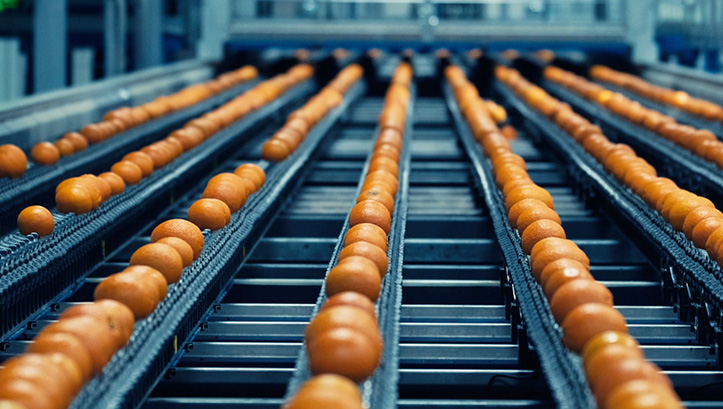Complete fruit processing lines are industrial systems that are designed to carry out all stages of fruit processing, from receiving raw materials to obtaining final products such as juices, purees, preserves, jams and others derivatives.
These processing lines are equipped with a variety of specialized machines and equipment that automate and optimize each stage of the process. Typical stages of a complete fruit processing line are described below:
- Reception and selection: Fruits are received at the processing plant and undergo an initial inspection. Damaged or spoiled fruits are removed.
- Washing and disinfection: Fruits are washed and disinfected to remove dirt, chemical residues and unwanted microorganisms.
- Peeling and pitting: Some fruits, such as apples, pears, apricots or peaches, may need to be peeled and pitted. This is done with specific machines.
- Crushing or cutting: Fruits are crushed or cut into smaller pieces to facilitate the next process.
- Juice extraction: If fruit juice is to be produced, the juice is extracted from the crushed pulp. This can be done with presses or juice extractors.
- Purification and filtering: The juice is purified and filtered to remove unwanted solids, such as pulp and seeds.
- Pasteurization: The juice is heated to specific temperatures to kill microorganisms and extend the shelf life of the product. Then it cools.
- Packaging: The juice or final product is packaged in bottles, cans, tetra packs or glass containers. This is done in a packaging machine.
- Labeling and coding: Labels with product information are applied and containers are coded with expiration dates and lot codes.
- Packing: Finished products are placed in boxes or packages for later distribution.
- Storage and distribution: Processed products are stored in appropriate conditions and distributed to points of sale or consumers.
Complete fruit processing lines can be highly customizable and tailored to specific product and process needs. Additionally, many of these lines are equipped with automated controls and monitoring systems to ensure the quality and safety of the final products.
Fruit processing involves a variety of stages, from receiving fresh fruits to preparing final products such as juices, preserves, compotes and more. The machinery used in fruit processing is adapted to these different stages and may include:
- Reception and Storage:
- Fruit conveyors and elevators to move fruits from delivery vehicles to the processing area.
- Cold rooms for temporary storage of fruits before processing.
- Washing and Sorting:
- Fruit washers to remove dirt and contaminants.
- Selection and classification machines that use sensors and cameras to separate fruits of different quality and size.
- Peeled and Boned:
- Peeling machines to remove the skin from fruits such as apples or pears.
- Pitting equipment to extract bones from fruits such as plums, apricots or peaches.
- Cutting and Slicing:
- Cutting and dicing machines to prepare fruits in specific shapes and sizes.
- Juice Extraction:
- Industrial juice extractors to extract juice from fruits, such as oranges, lemons and grapes.
- Pasteurization and Sterilization:
- Pasteurization equipment to eliminate microorganisms and extend the shelf life of products such as juice.
- Autoclaves and sterilizers used in the production of preserves and jams.
- Drying and Dehydration:
- Dryers and dehydrators that remove moisture from fruits for the production of dried fruits or fruit chips.
- Packing:
- Packaging machines that fill jars, bottles or bags with processed products and apply airtight seals.
- Lid sealers or cappers to close containers.
- Labeling and Coding:
- Labeling equipment that applies labels with product information, expiration dates, and lot codes.
- Quality inspection:
- Visual inspection machines and analysis systems that verify product quality.
- Freezing and Refrigeration Tunnels:
- Freezing and refrigeration tunnels that keep products at appropriate temperatures to preserve their freshness.
- Manipulation Robots:
- Industrial robots that can perform handling tasks, such as packaging and palletizing products.
- Measurement and Quality Control Equipment:
- Equipment that measures product quality, including texture, sugar content and acidity.
The machinery used in fruit processing can vary depending on the type of fruit, the desired end product, and production capacity. Investment in appropriate processing technology is essential to ensure quality and efficiency in fruit food production.
Starting from specific specifications in each case, we carry out the design and comprehensive production of Complete Lines that cover the specific needs of each client. Tell us about your needs and we will carry out a personalized project that adapts to your requirements. If you wish, we can work together from the beginning of the activity, renew your equipment or adapt to your new needs. Together, we are stronger. Each Project is unique and personal. Our capacity and experience enable us to tackle any possible project within the Food sector.
